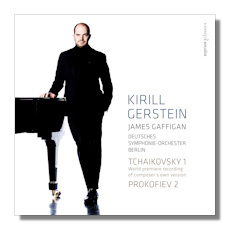
The Internet's Premier Classical Music Source
Related Links
-
Prokofieff Reviews
Tchaikovsky Reviews - Latest Reviews
- More Reviews
-
By Composer
-
Collections
DVD & Blu-ray
Books
Concert Reviews
Articles/Interviews
Software
Audio
Search Amazon
Recommended Links
Site News
 SACD Review
SACD Review
"The Real Tchaikovsky"

- Piotr Ilyitch Tchaikovsky: Piano Concerto #1 in B Flat minor, Op. 23 (CW53)
- Serge Prokofieff: Piano Concerto #2 in G minor, Op. 16
Kirill Gerstein, piano
Deutsches Symphonie-Orchester Berlin/James Gaffigan
Myrios Classics SACD MYR016 65:25 Hybrid Multichannel
Uh oh. This disc claims to contain the first-ever recording of the 1879 version of the Tchaikovsky First Piano Concerto, a dubious honor in the world of classical music. I'm all for new discoveries, but if Bruckner has taught us anything, it's that new editions can be disastrously unmusical. This particular version is a new edition from the Tchaikovsky Museum and Archive in Moscow, based on the edition apparently used by the composer himself.
There are differences right away following the opening statement by the piano, and there are small changes throughout. Kirill Gerstein takes a rather subdued and solemn view of the work, and while this is utterly preferable to simply banging away at the keys, I feel that this approach – and not the matter of editions – is the most noteworthy thing about the performance. It doesn't catch fire like Argerich, or dance like Cliburn, but it has a seriousness about it that I find intriguing. Conductor James Gaffigan (not to be confused in any way with the "Hot Pockets!" comedian) also subscribes to this rather cool and understated view. While not entirely free of bombast, I find the conception less fragmented and less clunky than most. Whatever the merits of the new edition – and for me, this is minimal – Gerstein and Gaffigan make it work and bring something new to the table. The slow movement is a little more brash and playful than the opening one, and this works very well due to the contrast that the overall approach provides. The Finale falls a hair flat because of the lack of playfulness and the somewhat disinterested playing of the Deutsches Symphonie-Orchester Berlin. Gaffigan yields neither the lightest nor most exciting hand, and Gerstein proves cultivated but rather unsmiling. I'm keeping this disc because I haven't heard a Tchaikovsky First like it in a long time, if ever.
In the Prokofieff, all parties let loose and deliver a highly satisfying reading of an underrated concerto. Kirill Gerstein may have been a touch too reserved in the Tchaikovsky; he's fiery and intense here. Only the orchestra is too plain-faced, but the engineering doesn't help matters, as the lower registers of the orchestra aren't always clear. As a coupling, this is rewarding. As a disc, this is eye-opening, and not even for the reason that the box proclaims.
Copyright © 2015, Brian Wigman





















